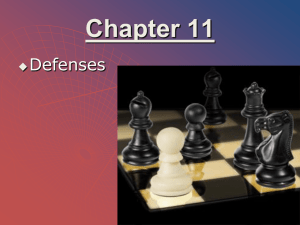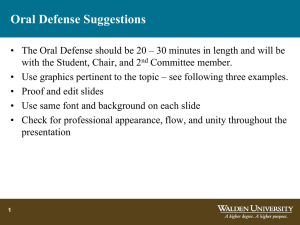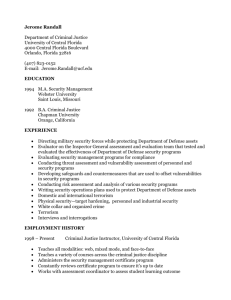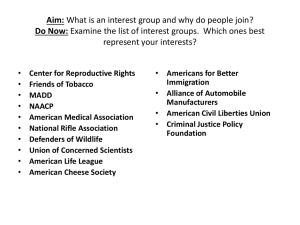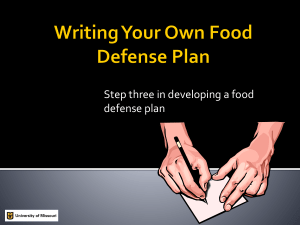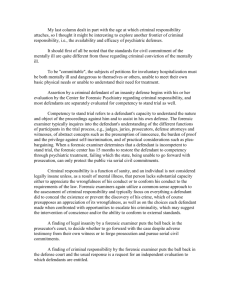Substantial Trial and the Independence of
advertisement
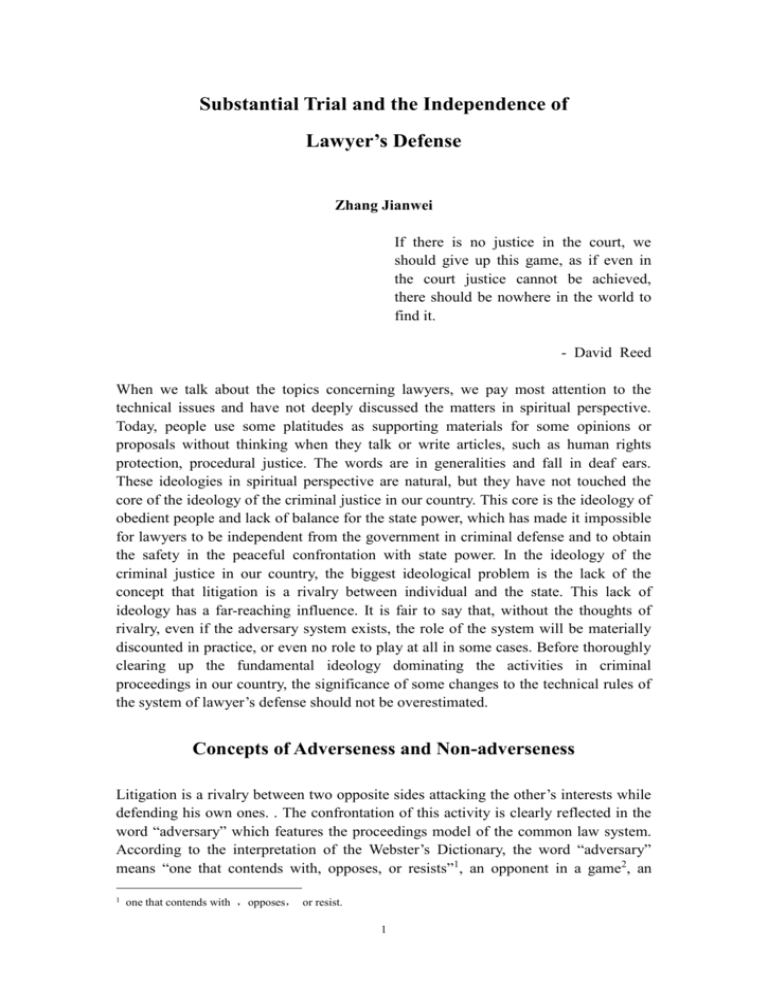
Substantial Trial and the Independence of Lawyer’s Defense Zhang Jianwei If there is no justice in the court, we should give up this game, as if even in the court justice cannot be achieved, there should be nowhere in the world to find it. - David Reed When we talk about the topics concerning lawyers, we pay most attention to the technical issues and have not deeply discussed the matters in spiritual perspective. Today, people use some platitudes as supporting materials for some opinions or proposals without thinking when they talk or write articles, such as human rights protection, procedural justice. The words are in generalities and fall in deaf ears. These ideologies in spiritual perspective are natural, but they have not touched the core of the ideology of the criminal justice in our country. This core is the ideology of obedient people and lack of balance for the state power, which has made it impossible for lawyers to be independent from the government in criminal defense and to obtain the safety in the peaceful confrontation with state power. In the ideology of the criminal justice in our country, the biggest ideological problem is the lack of the concept that litigation is a rivalry between individual and the state. This lack of ideology has a far-reaching influence. It is fair to say that, without the thoughts of rivalry, even if the adversary system exists, the role of the system will be materially discounted in practice, or even no role to play at all in some cases. Before thoroughly clearing up the fundamental ideology dominating the activities in criminal proceedings in our country, the significance of some changes to the technical rules of the system of lawyer’s defense should not be overestimated. Concepts of Adverseness and Non-adverseness Litigation is a rivalry between two opposite sides attacking the other’s interests while defending his own ones. . The confrontation of this activity is clearly reflected in the word “adversary” which features the proceedings model of the common law system. According to the interpretation of the Webster’s Dictionary, the word “adversary” means “one that contends with, opposes, or resists”1, an opponent in a game2, an 1 one that contends with ,opposes, or resist. 1 opponent of the declarer in the game of bridge or of the player of dummy3, having or involving opposing antagonistic parties or interests 4. Trial is a system that means confrontation, which goes on the basis of strict rules of evidence, along with exercising the right to cross-inquiry and debate. One party together with his witnesses try to prove facts necessary for the case in question, while the other party attempts to deny those facts or defend in a positive way5. This model of proceedings is called the “adversary system”. The proceedings of adversary system, positioning the parties against each other, is featured by the contentious verbal battle in the court. The American jurisprudent Lon L. Fuller believes that the phrase of “adversary system” can be used in its narrow sense and, when we talk about it in its narrow sense, we refer to a philosophy of judgment, a concept of method used to apply the law to a case before the court, a view concerning the roles of the lawyers of the opposite sides, of judges and juries in the judgment. 6 The American scholar describes the adversary system as a kind of procedure of debate, it means that the two equal opposite sides, i.e. the prosecutor on one side and the defendant and his defender on the other side, present the facts that they know to the court. The model is based on such a assumption that, when two parties aggressively exploring the truth confront each other face to face in the litigation, the truth is more likely to be found out.7 In terms of substantiality, the soul of the adversary system is the confrontation of the equal subjects. In criminal proceedings, because the principle of the state interference is adopted (reflected in the procuratorate’s active investigation of crimes and its prosecution on behalf of the state), the confrontation is between the state (government) and individual, i.e., a confrontation between the defense party and the authority that has investigation and prosecution power as well as a natural tendency to abuse its power. It reflects a resistance of the civilian rights against the power of the state. In civil proceedings, it is mainly a confrontation between equal civil subjects. Although we are talking about the fundamental spirit of the procedure in the common law countries, its essence has been accepted by the other countries and has become a basic standard of the modern criminal procedure. In most cases, apparently the criminal litigation is a wrestle between the procuratorate and the defendant and his defender and the confrontation takes place between two parties in the court. However, in essence the criminal proceedings is an adverseness 2 3 4 an opponent in a game. an opponent of the declarer in the game of bridge or of the player who plays the dummy. having or involving opposing antagonistic parties or interests. 5 [US] the Webster’s Third New International Dictionary, 3rd ed., p. 31. 6 Harold. J. Berman, Talks on American Law,Revised Edition, Voice Of America Forum Series., p. 35. 7 [US] Little Charles F. Henphill: US Criminal Proceedings, printed by the Office of Teaching Affairs, China University of Politics and Law. 2 between an individual and the state. This adverseness goes peacefully under the restriction of rules of law. It is impossible to understand thoroughly some modern systems relating to freedom protection without grasping this point. The ideology of individual versus the state comes from the following recognition: though the state power sometime becomes the protection mechanism of the freedom, it possibly threatens the freedom. The confrontation between the freedom and the authority appears in the form of the adverseness of individual against the state in the criminal proceedings. This adverseness reflects a nearly natural vigilance against the evil possibly brought in by the state power. The ideology of adverseness refers to such recognition that the state power is free from the abuse by a minority of people, then individual freedom is protected.8 In fact, it is just for fear of getting into a society of extreme power that many people stand in a position to protect the civilians by means of law against the state power and are vigilant against the move of their country to slavery. Just as said by Laski that civilians shall be very careful about any action of the government to protect their freedom from its selfishness. Any action of the state against the will of the civilians shall promptly bring in a tide of their blame and request for cancellation, as a result, the abuse and selfishness of the government can be controlled.9 It is not accidental that the adversary system originated in Britain. The British have a tradition of freedom, which is reflected in many aspects, especially that the British people nearly keep an eye for ever on the government to see if there is a harm to their freedom.10 In such a country where the people are vigilant all the time against any offense from the government, the government is placed under supervision. This spirit and practice that the freedom is greatly valued put the government in an opposite position and the latter is viewed as a dangerous power outside of man. In criminal proceedings, the effective restriction of this power is realized by means of confrontation of the government with man and the fair judgment by the independent court which does not take orders from the government. It is this ideology that the criminal proceedings in China lack in nature. Neither the legislator nor the judicial authority views the criminal proceedings as a peaceful confrontation process between man and the state. In ancient times in our country, it was an important task to nurture the obedience of the people in their mind. The rulers played tricks to fool the people and taught the people to become obedient. As this ruling art prevailed, countless obedient people were produced. In the eyes of a foreigner, as a result of this, the Chinese that look arrogant and resolute, once in face of a determined, persevering man, immediately 8 [UK] Laski: Political Classics II, translated by Zhang Shilin, the Commercial Press, p. 88. [UK] Laski: Political Classics II, , translated by Zhang Shilin, the Commercial Press, p. 88. 10 Zhu Anping, A Folk Collection in UK , Yuelu Press, Sep., 1986 ed., p. 88. 9 3 become weak, and like in hysteria.11 Sun Yat-Sen ever put it more straightforward that Chinese in their hundreds of millions “since their ancestors have been the slaves of despot, and quite a few do not know how to be masters, do not dare to be masters and are not capable of being masters.”12 These are all the achievement of the rulers. Dominated by the ideology of obedient people, it cannot give birth to the thoughts that the criminal proceedings are adversary proceeding against the government. The inquisitorial system in old days could not tolerate the confrontation of the inquisited party with the other inquisited party representing the government. The traditional trial in our country usually pays attention to the stateliness of the authority. To pay attention to the stateliness of the authority, it inevitably cannot stand resistance. This is fully described as follows: “When the old man heard the summons of the county governor, he was so frightened as to loose his head. He kneeled down in front of the desk and trembled all over, ‘This little man wishes your honor good health.’ Di Renjie saw the feared old man and recalled his running the day before and was delighted in his heart. He asked, ‘What’s your name? How long have you worked as a tugong?’ That man answered, ‘This old man’s family name is Tao, full name is Tao Daxi.’ Before he finished his words, the bailiffs standing alongside shouted out, ‘How dare you call yourself an “old” man before his honor. Beat you 200 to see if you will say you are old again.’ Having heard this, the tugong was so afraid that his face was pale, …” This obedient figure from the people, frightened and trembled when meeting an official, is accompanied with the ideology of non-adversary in litigation. The above is a vivid annotation on the procedural nature that the subordinates to the upper. At that time, the authority was depicted as deep-thinking, farsighted and insightful. The litigation was just a process in which the authority used the power endowed with by the royalty and the law to find out the truth of the case. It was not a confrontation between the government and individual. Therefore there was no independent, neutral arbitrator between the government and man. The government itself was the arbitrator. In contemporary society in China, the thoughts of obedient people still circle over the society. Such a description of the characters of the Japanese community by some one may also be suitable for China – this oriental nation that has been immersed by Confucian thoughts for centuries – that its citizens in ideology tend to be conservative, emphasize hierarchical obedience, family supremacy, patriarchal system, unanimous consent, etc..13 When it is reflected in the criminal proceedings, from the point of view of the legislature and justice, the starting point and end are still that the 11 Régis-Evariste Huc: The Chinese Empire-Further Thoughts on the Travel to Dadan and Tibet , indirectly quoted from the Nation Character of China (I), editor-in-chief: Sha Lianxiang, China Renmin University Press, 1989 ed., p. 3. 12 Sun Yat-Sen: the Outline of State Foundation, indirectly quoted from the Nation Character of China (I), editor-in-chief: Sha Lianxiang, China Renmin University Press, 1989 ed., p. 29. 13 [US] Louis Giannetti: Understanding Movies, translated by Hu Yaozhi, etc., China Film Press, Dec., 1997, 1st ed., p. 266. 4 state uses its power to “ascertain the truth of the case and punish crimes” and the challenge of any individual or organization against the state power is intolerable. The frequent suppression of the defense right is exactly relating to this non-adversary concept. In the criminal trial, the defendant is obedient to create a harmonious atmosphere for the following reasons: on one hand, the defendant in the court investigation actually undertakes an obligation of statement which reflects an oriental value that seeks the obedience of man to the state and emphasizes the harmony between the two; on the contrary, the right to silence, the right to refusal of statement are rooted in the individualist culture that strives for adversary and the resistance against the state’s undue interference with the individual freedom, which has not yet been completely accommodated in our criminal proceedings. On the other hand, the criminal policy of “leniency to those who confess their crimes and severity to those who refuse to” also declares publicly that the obedience is better while the adversary is worse. In the criminal trial, the defending side, especially the defendant, more frequently seeks compromise and cooperation other than resorts to confrontation to fulfill his expectation in litigation. In the court debate, it often appears that the defense lawyer states his “no dissent” to the criminal charge, facts or the evidence before he rebuts the prosecution and presents his defense opinions, in other words, he seeks a harmonious atmosphere with the prosecutor by means of saying common grounds first and then the difference. All these represent a lack of adverseness in the proceedings behind which the concept of non-adverseness lays.14 Substantial Trial and “Trial Show” The government confronts with man and they demand a trial in court that is independent from and does not take orders from the government, this should be deemed as a trial in substantiality that we call a “substantial trial”. The basic meaning of substantial trial is that the judge does not take orders from the government, in other words, the court is not the rubber stamp of the government, the judge is neutral and keeps an equal distance to both government and the defending side; the court should conduct substantial investigation and, for this reason, the prejudgment of the judge should be prevented or excluded; the trial is not allowed to be conducted just in a form; the judgment as a result should be founded on the inner witness that is formed by the evidence investigated in the hearing; the debate in the court should be adequate and the defense lawyer should have right to give full and complete presentation of his defense opinions, when he does so, his personal freedom should be secured during and after the hearing. The significance of the trial with substantiality is obvious. The defendant deserves the trial of the court, which is not only an unfavorable procedural burden he has to See my book: Criminal Justice: the Value of Diversification and the Structure of System, the People’s Court Press, 2003 ed.. 14 5 undertake in the criminal proceedings but also an important right he enjoys to seek justice. The guarantee of this right requires the trial to be substantial, in simple words, the trial must be a genuine one. If the trial just appears formal and grand, virtually it will be just a show through which the defendant’s procedural rights cannot be fulfilled, as a consequence, his substantial rights cannot be fulfilled either. In a substantial trial, the defender – especially the defense lawyer plays an important role. An ideal procedural structure is one where the judging side is neutral, the prosecutor and the defense side are equal in position and in rights. In this structure, if there is no participation of defender, the procedural capability of the defendant is limited and is often too weak to confront with the prosecutor, and it is hard to fulfill the aim of the protection of justice by means of the mutual restriction of the procedural subjects. The existence of the defender is equivalent to a support to the defendant when he is in an unfavorable imbalance between him and the prosecutor and it helps him to be stronger in proceedings so that the function of procedural structure in practice becomes comparatively justifiable. In this way, the defender plays an important role in safeguarding the impartialness. Only under a substantial trial can this function of the defender be fulfilled. The opposite of the substantial trial is the trial just for show, or simply called “show trial”. The basic function of the trial for show is completely for purpose of satisfying political propaganda. Some are just a delicate performance for a local or even a national TV live show, or just a play of record, or a performance for which a court has been forced to do so against its will. In a show trial, the activities in the court are not important, the judgment will not be rendered based on the inner witness which is formed in the investigation and debate in court, it even has been pre-made before the hearing. The role of the defense lawyer is just to cooperate to keep the performance going on, the proceedings go in such a way: “you debate as you wish, I’ll make the judgment as I want”. Some actors in such kind of trial appear very serious at times, which is depicted by someone as following: some court “with the national emblem appearing lofty and solemn, court police standing straight alongside, it’s grand, also crowded, everything is in good order, so serious is the hearing, a hearing as declared publicly to the whole city, to entire area, to all provinces, nationwide, to Asia, and even to the world. Who knows it’s just a play…”15 In a show trial, the confrontation in the court is just a play, the substantial issue of life, freedom, property of the person or persons involved are not important, instead, the form for confrontation in the court is important, just a play. The participation of the defense lawyer in the show is often against his will because a trial, even if it is just a show, appearing to the outsiders as “exactly a trial”, has something that the insiders know in mind but cannot tell, and he has to turn a deaf ear Zhang Yang: Sooner or Later – My Experience in Nan Yang Case, Hu’nan Science & Technology Publishing House. 15 6 and blind eye to everything that happened in the court with a peaceful mind. In some case, some lawyers have to attend the performance as if they were willing to do so. For instance, some court is dissatisfied with the show of the hearing and requires playing it once again. It’s not a business of its own, even the procuratorate, defender, defendant, etc. have to participate in this “performance for friendship” under its direction. The “trial show” in which the defense lawyer is forced to participate in as if with his willingness ruins the right of independent defense of the defense lawyer. In some trial, it’s not totally for show, the defense lawyer is even required to defend pursuant to the government’s intention, in other words, to defend according to the will of the opposite side of the confrontation. This often happens before the hearing of some “sensitive” cases where some lawyers are warned by the judicial administration authority (it needs to prove whether the court is involved) against his innocence defense or some of his defense opinions, etc.. After the announcement of the discipline, the lawyers have to act as instructed, otherwise the consequence would be miserable. In some cases, the presentation of the lawyer has to be submitted to the judicial administration for scrutiny before the hearing. If it dissatisfies the authority, it has to be modified or even re-written. This makes a trial go as the “director” wishes so that the adversary system is impaired and the hearing in the court becomes a play in theater. The fundamental reason why the show trial goes is the lack of the ideology of adverseness of individual against the state in criminal proceedings, and that lawyers are required to be obedient to the will of the government so that a trial will not “go out of control”. In terms of system, the reason is that lawyers have no right to independent defense and there is no system to guarantee their independent defense. Lawyer’s Defense is Independent of the State As early as decades ago, a scholar in our country, Zhu Caizhen ever pointed out that “Suppose the judgment system has come into being, no matter it is an official judgment or an arbitration by citizens, how can one imagine if there is no defense system? Just let the procuratorate attack the defendant as it wishes? Just let the judge arbitrarily determine the case on the basis of the words of the procuratorate? If so, all evil consequences would come down and the entire society will be the bearer. To protect the interests of the defendant, the defense system shall be upheld and, in abstract, the protection of interests of the defendant is indeed to protect interests of the entire society because every component of the society faces a possibility of becoming defendant in the criminal proceedings. This is the value of the defense system.”16 Well, how to fulfill this value of the defense system? The simplest answer to this 16 Zhu Caizhen: A New Theory of the Criminal Procedure Law. 7 question is the independent defense. A professor Alan Dershowitz of Harvard Law School said so clearly that the earnest, conscientious, active and enthusiastic lawyers are the last fort of freedom – is the last line of defense against the fierce government bullying its citizens. It is the task of defense lawyers to supervise and challenge the government’s behaviors; to let these powerful respectable to think carefully before they act improperly against the weak and warn them of the possible legal consequences; to appeal; to protect the legitimate rights of those who are isolated, weak and aggrieved(even the rich and powerful persons, though far better off than the poor, given the resources available to them, are still no exception when confronting the government. He also emphasized that one of the test for genuine freedom in a country is its attitude to those who defend for the criminal or for those who are generally looked down upon. In most of dictatorships, independent defense lawyers do not exist.17) The “independent defense” in here means that the state, social organizations, or any individuals do not intervene in the defense conducted by the defender. The defender – especially the defense lawyer – conducts the defense based on his discovery of the facts and evidence and his understanding of law, neither state authorities nor social organizations should put their nose in the defense activities of the defender so that there is no interference in his defense and that he has no fear of trouble back at home which would hamper his free speech in court. Or else, the existence of the defender would be an ornament without any substantial significance. The defender should also be independent from the criminal suspect or the defendant. His relationship with the criminal suspect or the defendant is deferent from that between the representative and his client in litigation. The defender is not a microphone of the criminal suspect or the defendant. In the proceedings, he conducts his defense independently in his own name, based on his discovery of the facts and evidence and his understanding of law, and is free from the expression of the intention of the criminal suspect or the defendant. Nevertheless, the defender should conduct his independent defense to such an extent not to damage the interests of the criminal suspect or the defendant. If the defense damages the interests of the criminal suspect or the defendant, it would be against the purpose of law in establishing the system of the defender. In addition, the defender should conduct his defense independently as permitted by law. For lawyers, they should also observe their professional ethics and practice disciplines, for instance, during the defense, the defender must not induce the witness to present perjury, must not behave to impair the judicial administration. As yet, the parties do not cause problems to the independent defense. The real problem is the interference of the government in the defense of lawyers. The systematic restrictions of the behaviors of lawyers should be composed of the statutory stipulations, the Bar disciplines and the customary practice in the Bar. These stipulations, disciplines and customary practice are not made at will, they must be justifiable and reasonable, and must favor the improvement of justice, prevent any 17 [US] Alan Dershowitz: the Best Defense, translated by Tang Jiaodong, Law Press China, Dec., 1994 ed., p. 482. 8 tendency of abusing the state power, promote the real fulfillment of the adversary in the proceedings. The independent defense also requires the defender not to be forced to be a messenger of the government. The defense is a defensive function against the prosecution raised by the prosecutor. This function facilitates maintaining justice. To play this role, it must not be confused with the prosecution function. This requires the defender to stand firmly on the position of his function and not to confuse the deferent functions to impeach or disclose as a “second prosecutor” the criminal acts that have been carried out by the criminal suspect or the defendant Therefore, the defender should have a duty of confidentiality for the criminal suspect and the defendant. The law in our country does not endow lawyers with the right to immunity of testimony as many of the other countries do. This is a regretful lack in our legal system that should be remedised by new amendments. Independent defense of lawyers means that they have the right to presentation before the court that make the government feel uncomfortable. To have lawyers enjoy the right to independent defense, they should enjoy the immunity of liability for free speech. It’s worse to “detain” a lawyer to make him liable for his speech that has provoked the government officials. If there is no such guarantee, even the word “independent defense” is written on the forehead of lawyers, they still fear to do so. Why must lawyers enjoy the right to independent defense when they trouble the state? This relates to the dual character of the state. The state and its power have a dual nature. It can satisfy the demand of the people for united force, while it may also threaten the freedom of the people greatly. A former President of Germany, also a former President of the Federal Constitutional Court of Germany, Roman Herzog held that the state has dual nature: in the human history, the state has brought about tribulations and destruction to millions of people. However, it has provided protection of the life and wealth of millions of people. Without it, the orderly development of human history in some way would not have happened. Just as all the other things created by human beings, the state has a dual character. It has dual nature just as human beings themselves. 18 Sir Karl Raimund Popper also clearly depicted the danger that the state power contains. He pointed out that, though the state is necessary, it has a kind of danger or (so bold to say in such a way) an evil all the time because, when the state discharges its function, it certainly has a force much stronger than any individual citizens or public communities anyway. Although we can design various systems to reduce the danger of abusing such power to the minimum, we cannot absolutely eradicate this danger. On the contrary, it seems that most people have to obtain the protection of the state at costs, not only in the form of tax payment, but also even in the form of bearing humiliation, such as being subject to the tyrannical and 18 [German] Roman Herzog: Staaten der Frühzeit. Ursprünge und Herrschaftsformen. , Chinese version, Peking University Press, Oct., 1998, 1st ed., p. 2. 9 iniquitous officials.19 Only by recognizing the dual nature of the state power can we consciously restrict the state power and prevent the state authorities from their arbitral actions. The system of independent defense of lawyers is just right an important procedural mechanism with such restrictive function. Conclusion An American scholar John R. Waltz said to the effect that adversary seems to be by far the best way invented to get to the truth.20 This best way needs application. To really fulfill the adversary system, there must be the ideology of equality between officials and citizens as well as the system of equal adversary between officials and citizens. Nevertheless, the difficulty is not in the civil procedure, but in the criminal one. The critical point of the difficulty in the criminal procedure is the equality between officials and citizens. As a matter of fact, one of the major difficulties in the reform of our criminal defense system is that the equality between officials and citizens, between man and the state to confront in the proceedings has not been rooted in the people’s heart, has not become a custom. It’s still a long way to build up the ideology and the systematic protection of the justice system. David Reed once said to the effect that if there is no justice in the court, we should give up this game, as if even in the court justice cannot be achieved, there should be nowhere in the world to find it.21 It might be wrong, at least the heroes of Shuipo Liangshan would lend a deaf ear to it. However, when it comes true, you would be rejected by the “royalty” and forced to resort to the wild, the legitimacy of the government would no longer exist, the peace nature of the confrontation between individual and the state would not be available. 19 [UK] Sir Karl Raimund Popper: Conjectures and Refutations , Chinese version, Shanghai Translation Publishing House, Aug., 1986, 1st ed., p. 500. 20 [US] John R. Waltz, Criminal Evidence, Chinese People’s Public Security University Press, 1993 ed., p. 7. 21 David Reed: Judgemnt, translated by Sun Jianqiu and others, China Film Press, 1990 ed., p. 232. 10



